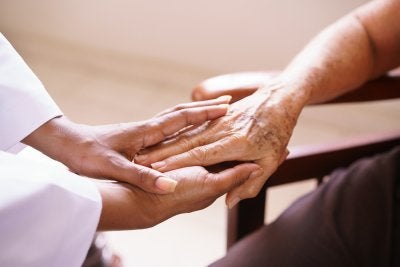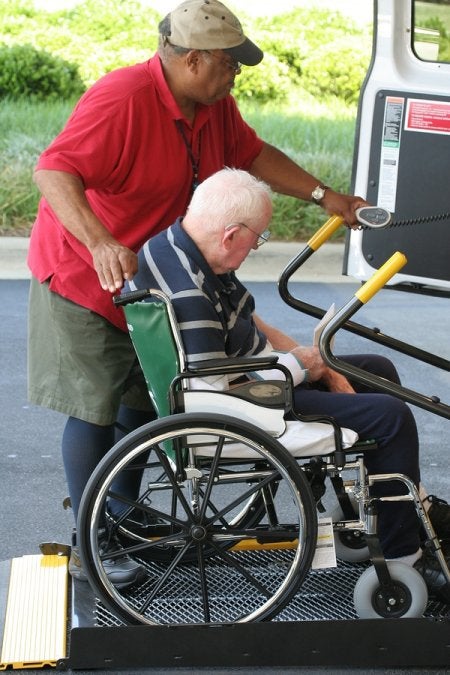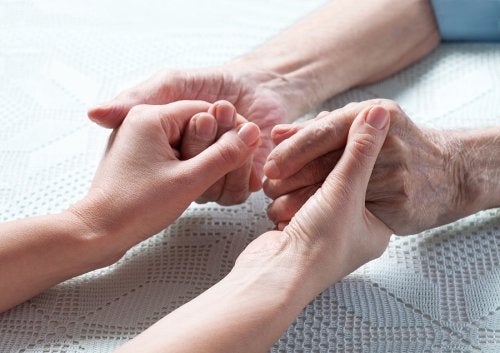-
When Is Hospice the Right Choice?
If you or a loved one has a terminal illness, it’s time to consider hospice care. This model of care has an undeserved stigma attached to it, but families who do choose hospice care near Memphis discover that it offers many benefits. Terminally ill caregiving is difficult for families to handle by themselves. Hospice opens up new possibilities for gracious and dignified living toward the end of life.

When Curative Treatments Aren’t Working
Modern medicine can work miracles, but sometimes, it just isn’t enough. Gravely ill patients do have the option of considering clinical trials when they have exhausted other treatment possibilities. But sometimes, clinical trials aren’t a possibility either if the patient isn’t eligible for them or there are no appropriate clinical trials being offered nearby. When medical treatments intended to cure the disease are no longer a feasible option, hospice care is a wise decision.
When Curative Treatments Do More Harm Than Good
Some patients have the option to choose curative treatments that are intended to extend life, but are not expected to cure the disease. For example, patients with advanced lung cancer might have access to some of the newer medications intended to give them a few more months of life. But not all patients want to take this route. Some curative treatments, especially for terminal illnesses like advanced cancer, can cause complications that may reduce quality of life. If aggressive medical care isn’t the answer, then perhaps hospice care is.
When Families Need Flexible Options and Sensitive Care
Hospice care does not have to involve confinement to a hospital bed in a lonely facility. It’s actually a flexible choice that treats patients and their families with the respect and dignity they deserve. Many hospice patients remain in their own homes, surrounded by their loved ones. Every hospice patient’s care plan is customized to meet his or her needs—and the needs of the family. A care plan may include placing durable medical equipment in the home, such as oxygen therapy equipment. Contrary to popular belief, hospice patients do continue to receive medical care. They can receive any medical care that can manage symptoms and improve quality of life. This is known as palliative care, and it allows patients to live the remainder of their lives with dignity and grace.
-
Skip the Housework After Spine Surgery
Spine surgery is a major life event, and it’s important to be thoroughly prepared for the recovery process. Once you transition home after the surgery , you can expect to require in-home care, such as the services available from an assisted living provider. This is especially important if you do not have family close by to help you out around the house. After your spine surgery, you can count on an in-home caregiver in Memphis to handle meal prep and housework for you.
Listen to the nurse navigator featured in this video to learn more about recovering from spine surgery. She points out that patients can generally expect to be told not to bend or twist their torsos, or lift any objects heavier than 10 pounds. It’s also important to follow your doctor’s discharge instructions. An assisted living provider could help you out by giving you medication reminders.
-
5 Tips for Stimulating the Appetites of Alzheimer’s Patients
Caring for elderly patients can be challenging, especially when they are affected by Alzheimer’s disease. This common form of dementia often causes the loss of appetite and, subsequently, unintended weight loss. Significant weight loss can bring its own health complications. If you’re having trouble coaxing your loved one to eat regularly, an in-home caregiver in Memphis may be able to help. Reduce mealtime distractions.Sometimes, people with Alzheimer’s have trouble during mealtimes because the environment is too cluttered or noisy, or because they cannot multitask well. Turn off the TV and radio at mealtimes, and clear the table of clutter. If these steps aren’t sufficient to convince the individual to eat, try serving just one or two types of food at a time.Keep your loved one company during meals.People are social creatures and often prefer to eat in the company of others. If it isn’t possible for you to sit with your loved one during each meal, it may be time to hire an elder care provider to give your loved one the companionship and practical care he or she needs. When you are able to dine with your loved one, make eye contact and convey positivity with your facial expressions. Your loved one may be more likely to eat if you are eating, too. Some individuals may do better with quiet, pleasant conversation, while others are too distracted by talking.Make eating as easy as possible.
Reduce mealtime distractions.Sometimes, people with Alzheimer’s have trouble during mealtimes because the environment is too cluttered or noisy, or because they cannot multitask well. Turn off the TV and radio at mealtimes, and clear the table of clutter. If these steps aren’t sufficient to convince the individual to eat, try serving just one or two types of food at a time.Keep your loved one company during meals.People are social creatures and often prefer to eat in the company of others. If it isn’t possible for you to sit with your loved one during each meal, it may be time to hire an elder care provider to give your loved one the companionship and practical care he or she needs. When you are able to dine with your loved one, make eye contact and convey positivity with your facial expressions. Your loved one may be more likely to eat if you are eating, too. Some individuals may do better with quiet, pleasant conversation, while others are too distracted by talking.Make eating as easy as possible.As Alzheimer’s disease progresses, managing eating utensils becomes more difficult. An elder care provider can prepare meals that work well as finger foods. Instead of salad, serve crudité. Instead of grilled chicken breast, serve chicken strips.
Serve smaller meals and snacks frequently.
It’s not always practical to expect a person with Alzheimer’s to eat a large meal. It’s often more feasible to gently coax him or her to eat small snacks between meals. Try serving nutritional supplement drinks or soft foods, such as eggs, pudding, or smoothies.
Prepare your loved one’s favorite foods.
Nutritious, well-balanced meals are important, but sometimes, it’s better to choose your battles wisely. Preparing your loved one’s favorite meals, even if they aren’t particularly healthy, can help stimulate his or her appetite.
-
Designing an In-Home Care Plan for a Parent with Alzheimer’s
Alzheimer’s disease and other forms of dementia place a considerable burden on families. Elder care at home is usually preferred, but families often lack the time to provide 24/7 care and monitoring. Home health aides in Memphis can bridge the gap between an aging parent’s needs and a family caregiver’s capabilities. If your parent has been diagnosed with Alzheimer’s, it’s time to have a conversation with an assisted living provider.

Identify Needs
Every elderly parent with Alzheimer’s has unique needs, usually depending on the stage of Alzheimer’s they are dealing with. Before designing your parent’s in-home care plan, it’s a good idea to meet with the family doctor to discuss your parent’s specific needs . The doctor may recommend that your parent stop driving if he or she hasn’t stopped already. Other recommendations may include the following:
- Starting new medications
- Making home modifications for fall prevention
- Adding safety devices (e.g., automatic stove turn-offs)
- Wearing a medical alert button
- Receiving assistance with meal preparation and feeding
- Enjoying safe physical exercise
- Engaging in daily cognitive stimulation
Speak with Family Members
Once you have a list of all of your parent’s needs, it’s time to have a talk with other family members about arranging in-home care for your parent. Although an in-home caregiver can provide nearly all of the services your parent may require, most families will still want to be involved with the care plan in some way. Coordinate with other family members who want to provide occasional care. Your sister might take mom or dad for a weekly walk in the park, for instance, while your brother might volunteer to make a couple of meals each week. https://mostbet-games.net/hy/
Ease the Transition
Significant change isn’t easy for many people, particularly aging parents with Alzheimer’s disease. If your parent is a little unsure about the prospect of having a home health aide, it’s best to make the transition gradually if possible. Your parent may want you to be present during the first few visits. As your parent becomes increasingly comfortable with the idea of receiving professional care, the home health aide can take on more tasks without your presence.
-
Supporting Your Healing After Surgery
It’s often thought that assisted living services are primarily used on a long-term basis, but in fact, many individuals can benefit from temporary elder care from a caregiver agency near Memphis. To support your recovery after surgery, Caring Companions provides transitioning home care , including healthy meal preparation.
When you watch this video, you’ll learn about the types of foods that can best support your recovery after surgery. You can boost your immune system by choosing oranges, kiwis, and strawberries for the extra vitamin C. Your immune system also needs plenty of lean protein from sources like low-fat dairy products, poultry, fish, and nuts. It’s important to eat enough fiber after surgery, since prescription painkillers often cause constipation. Old-fashioned rolled oats and prunes are excellent sources of fiber.
-
Caregiver Stress 101
Providing elder care to an aging parent brings significant challenges to a family. Caregiver stress is a term that refers to the physical and emotional challenges that can cause a family caregiver to feel overwhelmed and be more susceptible to ailments. It’s important to take caregiver stress seriously and to be proactive about dealing with it. Coping with the challenges of elder care is never easy, but respite care delivered by home health agencies in Memphis can help you tend to your loved one’s needs, as well as your own.

Physical Ailments
The stress of family caregiving depresses the immune system and leaves individuals more vulnerable to physical health problems. If you’re like most family caregivers, you probably feel exhausted all the time, yet have trouble falling or staying asleep. You may unintentionally gain or lose weight, fail to eat a balanced diet, and neglect to exercise. You may catch colds more easily and suffer from frequent headaches. If you must lift your aging relative, you’ll likely experience lower back pain that may become chronic.
Cognitive Impairments
Chronic and severe stress can compromise one’s mental clarity . You may find it difficult to concentrate on work or even on leisure activities, if you still have time for these now and then. Your performance at work may decline and you might have trouble helping the kids with their homework. You may constantly forget things and you might have trouble with complex conversations.
Emotional Challenges
Caregiver stress can cause a wide range of emotional problems. It’s normal for family caregivers to sometimes experience anger. You may feel angry toward your aging loved one, despite knowing that he or she didn’t intentionally create these challenges and despite continuing to love your relative. You may feel anger toward other family members if you feel they haven’t given you enough help. Anxiety, depression, irritability, and social withdrawal are other common emotional challenges.
Proactive Strategies
Caregiver stress is practically inevitable for any family member who is trying to juggle the demands of elder care, work, kids, and personal needs. It simply isn’t possible to do everything by yourself, nor should you have to. Respite care is available from home health agencies. This is temporary, in-home care that lets you take a step back while still ensuring that your aging relative gets the help he or she needs. Use your time to go on a weekend get-away or simply to catch up on your responsibilities.
-
Why Do Cancer Patients Need Transportation Assistance?
Unless a close family member has been diagnosed with cancer, it is often difficult for individuals to fully grasp the extent of the needs of these patients. Quite often, families dealing with cancer discover that they require in-home care provided by Caring Companions in Memphis. An assisted living provider can help cancer patients with a wide range of needs, including transportation to the dozens of doctor’s appointments that follow the diagnosis. Cancer patients may have multiple appointments in just one week for medical testing, oncology consultations, injections, and chemotherapy. If they are going through a round of radiation therapy, they will need to get to the radiation therapy clinic every day.
It’s difficult for families to meet the many demands of cancer treatment. It is often necessary to arrange transportation from an assisted living provider because cancer patients cannot drive themselves to and from appointments for several reasons. Patients are usually taking powerful painkillers, which prevents them from driving. They are also likely to experience debilitating side effects from cancer and its treatment. In some cases, the patient may have significant mobility deficits and cannot get around the house by him- or herself, let alone drive a vehicle. But with transportation assistance, cancer patients can safely get to where they need to go for their care.

-
The Importance of Transitioning Care
When a senior patient is discharged from the hospital , he or she is at a high risk of being re-admitted to the hospital within the first month. Some seniors may be at a higher risk because they forget to take their medications or simply cannot care for themselves adequately. This is why it is so important for families to arrange transitional care provided by a professional caregiver in Memphis. With transitional elderly care, families can rest assured that their loved ones are being well taken care of.
Watch this video to find out more about the benefits of elderly care or consult a caregiver agency near you. The health expert featured here explains that an estimated one in five seniors is either re-admitted to the hospital or dies within one month of discharge. These risks decline gradually over the next year.
-
How Loneliness Can Affect Health in Seniors
Millions of seniors live alone in the U.S. Social isolation is quite common among seniors because of transportation and mobility difficulties, bereavement, and retirement from the workforce, among other factors. When seniors suffer from social isolation, they are at a higher risk of emotional, mental, and physical health problems that can jeopardize their longevity and reduce quality of life. One effective solution is assisted living . In-home caregivers in Memphis provide both the practical assistance and the companionship that seniors need to live life well.

Emotional Effects
For many seniors, loneliness becomes an unfortunate fact of life. Without the loving companionship of an in-home caregiver, many seniors have little to look forward to each day. When a senior believes that his or her loneliness will last for the rest of his or her life, it becomes much more difficult to bear. Seniors who are socially isolated are at a higher risk of developing clinical depression and suicidal thoughts or actions.
Mental Health
Social isolation is a crucial source of cognitive stimulation. When seniors are chronically lonely, they may be more likely to display signs of memory loss, confusion, and other mental impairments. Studies also suggest that socially isolated seniors may develop dementia that progresses more rapidly than it otherwise would.
Physical Wellness
The wellness of the mind can significantly affect the health of the body. Seniors who are socially isolated , particularly those who struggle with depressive symptoms, have been shown to have an increased risk of high blood pressure and other cardiovascular health problems. They are also at risk of falls that can cause disabling injuries and mortality is more likely. A possible contributing factor to the decline in physical health of a socially isolated senior is that there is no elder care provider to offer medication reminders, prepare nutritious meals, and assist with mobility. Seniors with depression may neglect to eat or take care of their personal hygiene. Some of them may even choose to self-medicate their loneliness with alcohol. These problems are certainly alarming, but they are also preventable. Assisted living services allow seniors to remain connected with others while still living independently in their own homes.
-
Comfort for Caregivers During the Final Stages of Life
When a loved one is receiving hospice care in Memphis , it can be extremely difficult for family and friends to come to terms what is happening. It’s important to remember that end-of-life care is focused on your loved one’s comfort, so you can feel confident that he or she is not suffering. Part of hospice care is also caring for the family and friends of the person who is nearing the end of his or her life, so rely on the help that is available.
Remember to make time for yourself each day to focus on something that brings you pleasure, whether it is a coffee with a friend or simply watching television. Let the hospice provider meet the care needs of your loved one so you can focus exclusively on the time you have together. Don’t fall victim to isolation. Talk about your feelings to family and friends, and ask for help from the hospice caregiver when you need it. He or she can be a tremendous source of comfort, information, and support during this time.

